Blog
Podcast SEO: How to Make Your Podcast Rank Higher

Published 11/03/2024 by Babalola Alabi
PodcastingCreating great content and making sure they reach your audience are two different things. No doubt, there are millions of podcasts in different niches looking to be heard or viewed like yours. But the competition is high and could be quite frustrating which is why a strong podcast SEO is important for making your audience discover your content quickly.
Similar to how search engine optimization affects websites, SEO for podcasts has a huge influence on your podcast’s discoverability and ranking. In this article, we’ll discuss the process needed to build your podcast on a strong podcast SEO foundation for long-term results.
Why is Podcast SEO Important?
Podcast SEO involves strategies and tasks you do to help your podcast gain more recognition, discoverability and also rank high on search engines.
Spotify and Apple have a combined 7.6 million podcasts which is set to increase even as the year goes by. As a result, some podcast content stay redundant as they are uploaded because of low visitor count and extremely high competition.
In that case, investing your time and resources in podcast optimization could be the perfect strategy you need to make your voice heard. Other importance of podcast SEO include:
Reach and Discoverability
Most podcast listeners go to search engines to search for podcasts using specific keywords. If your podcast ranks for such keyword on the search result page, there is a high probability that more people will reach and listen to your content more often.
Builds Authority for your Podcast in your Niche
Publishing high-quality content consistently establishes you as a thought leader in your niche. It shows your level of expertise, credibility and influence in the niche and with SEO, people will discover your podcast and become loyal listeners.
Long Term Growth
Investing in podcast SEO is similar to investing in a business. SEO is a continuous process that ensures your podcast becomes the go-to podcast over time. Unlike ads and other strategies, all you have to do is update your podcast details periodically and follow the right podcast SEO steps.
How to Optimize your Podcast for Higher Rankings on Search Engines
Podcast SEO is an easy process and with these four steps, you can effectively make your podcast rank on search engines.
1. Strategic keyword research and usage for word contents
When people talk about SEO, the first thing that comes to their minds most time is keywords. Although SEO covers a wider range than keyword research and usage, it is still an important aspect of podcast ranking.
They are words your target listeners type into Google in search of an answer to a query. Keywords increase your chances of being discovered by your audience, but how do you add them to your podcast?
By simply including the keywords in your titles and descriptions.
These two are the written contents of your podcast and should be leveraged appropriately.
As important as keywords are, choosing and using the right keywords is more important. To find the right keyword;
- Choose a base keyword and generate a list of possible queries your target audience will type into the search engine to discover your podcast. For example, an email marketing podcast could target a keyword like “email marketing podcasts”. However, it is preferable and advisable to focus on super-specific keywords.
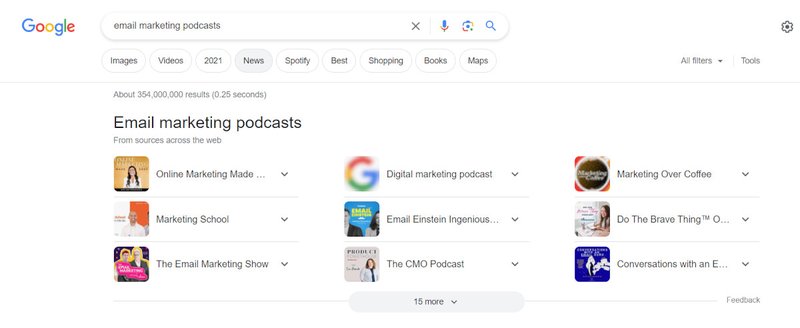
- Choose a suitable keyword research tool. Some recommended tools include Semrush, Ahrefs and Free Keyword Tool by Backlinko.
- Make research on the keywords your competitors are using.
- Check if your podcast ranks for some keywords. If it does, add the keyword list to your general keyword list and work towards using them in your written content but in the most natural way.
- Search a keyword database and target keywords with low SEO difficulty and high volume.
- Add the keywords to your titles and descriptions naturally. Avoid keyword stuffing.
How to create an optimized podcast episode title
Your episode title tells podcast platforms and search engines what your episode is about. The title is then matched with search queries of your target listeners, and presented to them as an answer to their query. To make your episode title relevant;
- Your title length should not exceed 60 characters. Titles with longer characters are cut off when displayed on search result pages.
- Keep your title simple.
- Add your unique primary keyword to your title.
- Your title should contain words and phrases that describe and meet up with the search intent. For example; instead of “email newsletter title”, use “how to create the best email newsletter titles”.
- Add important information like guest names to the title.
How to create an optimize description and show note in a few clicks
After researching your keywords and choosing the right ones that suit your podcast, you can then create your description and insert your keywords easily. How?
Use SoundMadeSeen
SoundMadeSeen is an all-round audio-to-video creator that doesn’t only convert audio to video in a few clicks but also generates content like blog posts, social media captions, show notes and descriptions for your podcast. To generate a well-optimized description,
- Create an account on SoundMadeSeen.
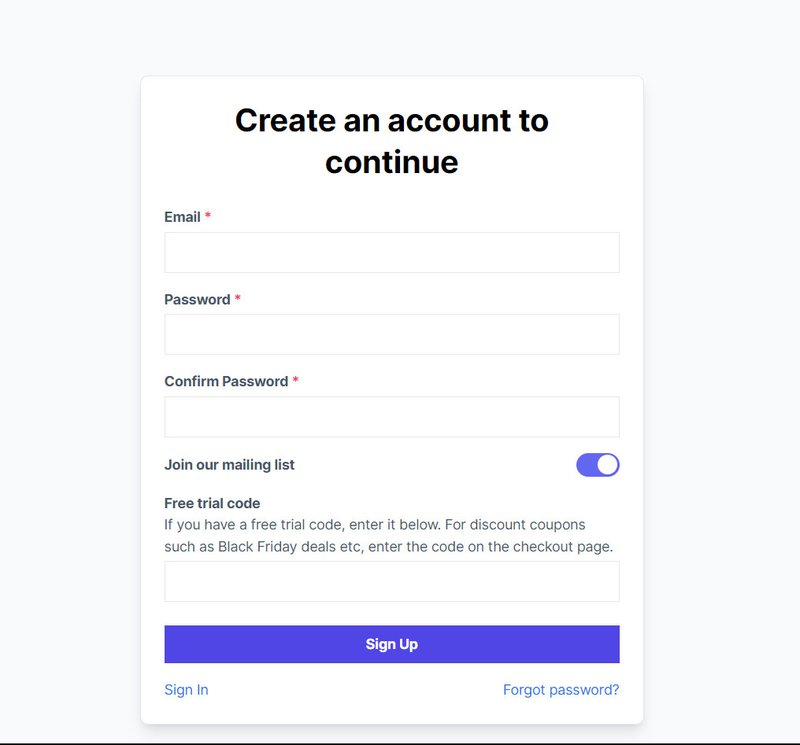
- Upload your audio or search for your podcast and choose the episode you wish to use.
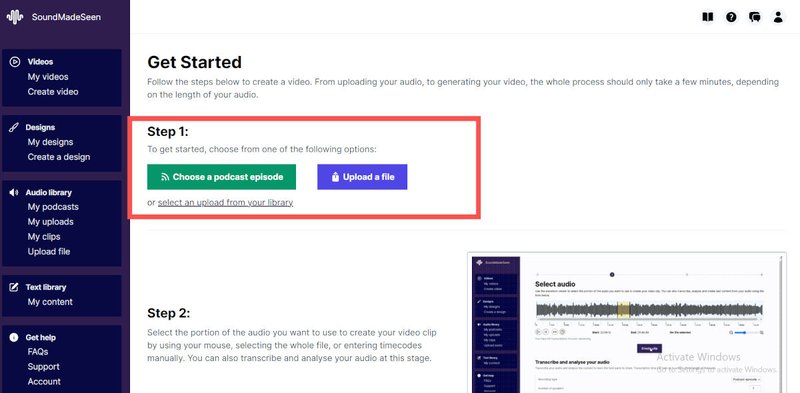
- Edit settings and transcribe your audio.
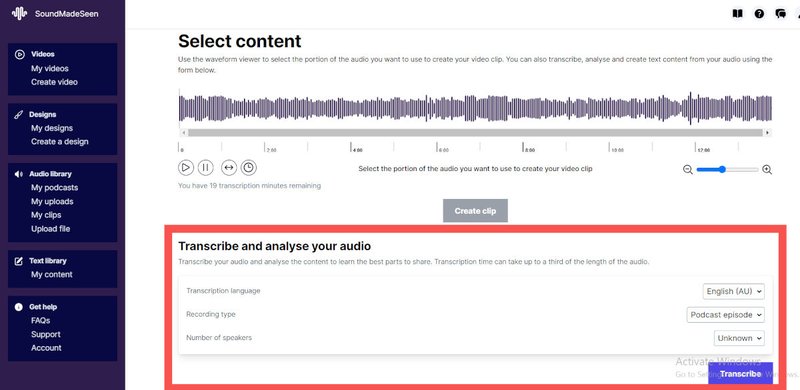
- Click on “Create content” to create your podcast description and show notes. Change the content type to show notes.
- Click on the “Show more option” on the far right. This gives you the option to add your keywords, call to action, and intended audience. You can also add additional notes you want SoundMadeSeen to do and take note of.
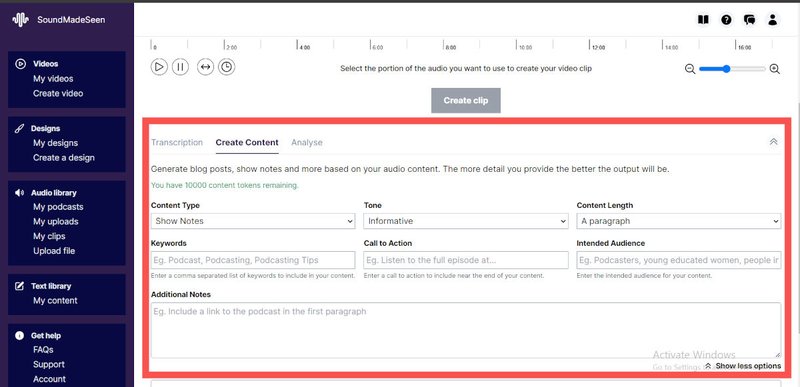
- Generate your content and edit it as much as you wish to.
Bonus step:
You can also create short video clips and convert your audio to video for social media sharing and promotion on SoundMadeSeen.
Aside from your podcast title and description, you can also add keywords to other strategic places on your website like:
- Subheadings
- Beginning and end of your post
- URLs of your post
- Image file names
- Image alt texts
2. Add written content to each podcast episode.
It’s easier for search engines like Google to scan written texts. Complimenting your written texts with audio content allows Google to understand your content and what it’s about. Your podcast could also have a higher advantage if the right keywords are added to the texts.
In addition, you don’t expect listeners to show up and listen to your podcast just like that, right? They must be convinced and inspired to listen to the content. An easy way to do that is by adding written content like transcripts and show notes to your podcast.
To generate show notes, use SoundMadeSeen and follow the steps above. You can add some touch of value to your podcast episode by repurposing the content with transcriptions.
3. Build High-Quality Backlinks
Another podcast SEO tactic that is relevant and effective is building high-quality backlinks.
Backlinks act as "votes of confidence" from other websites. They are links on other websites or web pages that point to your website or webpage. The more high-quality backlinks you have, the more important and relevant search engines like Google consider your website to be.
To build high-quality backlinks for your podcast SEO, do the following:
- Focus on creating high-quality content to attract natural backlinks.
- Leverage guest appearances who have their online presence already as this helps create more natural backlinks when they share your podcast episode.
- Prompt your podcast on social media to increase visibility and encourage others to share your podcast.
- Avoid using manipulative techniques such as buying backlinks or participating in link schemes.
- Appear natural, don’t over-optimize your texts as it may raise red flags with search engines.
- Acquire backlinks from reputable sources rather than pursuing a high volume of low-quality links.
- Ensure that your website is well-designed, user-friendly and optimized for search engines.
4. Optimize your website periodically
As you create more content, optimizing makes you stay relevant in the search engine result page. This involves creating more content, using keywords rightly, optimizing titles, subheadings, URLs and other things needed to meet up with the new challenge.
In addition, search engines like Google release updates periodically for the SEO world. These updates could involve making a few changes to podcast optimization and ranking conditions and should be followed strictly to prevent de-ranking and deprioritization on the search result page.
Get Some Amazing Results Easily!!

After creating the perfect SEO content strategy for your podcast, next up is to implement this strategy correctly. You can only get the best results by doing the right thing consistently.
Don’t have to overthink things, keep it simple and avoid unnecessary additions to the strategy. Analyze your performance, make changes and improve as you continue to tailor your content to the most needed things the customer needs and also build trust.
And with that said, your path to premium discoverability, traffic and search will be easier than you think.
Start creating for free
Turn your podcast, audiobook or talk into sharable video and text content
Try it today


